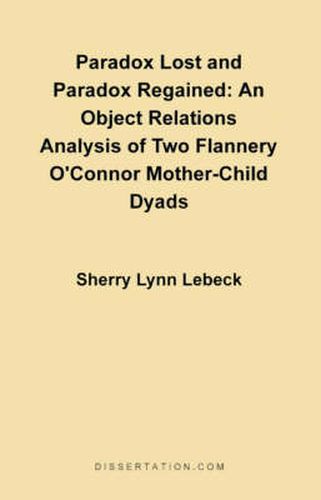Readings Newsletter
Become a Readings Member to make your shopping experience even easier.
Sign in or sign up for free!
You’re not far away from qualifying for FREE standard shipping within Australia
You’ve qualified for FREE standard shipping within Australia
The cart is loading…






This title is printed to order. This book may have been self-published. If so, we cannot guarantee the quality of the content. In the main most books will have gone through the editing process however some may not. We therefore suggest that you be aware of this before ordering this book. If in doubt check either the author or publisher’s details as we are unable to accept any returns unless they are faulty. Please contact us if you have any questions.
This study uses two short stories by Flannery O'Connor to explore D. W. Winnicott’s theory of early childhood development. This thesis proposes that the inherited potential of the individual is determined by the quality of the early maternal environment, especially during the period of Winnicott’s first two paradoxical stages of development: Absolute Dependence and Relative Dependence. The mother-adult/child relationships in O'Connor’s two short stories Good Country People and The Enduring Chill serve as case studies to examine the ramifications of not good-enough mothering on the infant’s psychological state during these first two stages of development. The concepts of mirroring, impingement, true and false self development, illusion, transitional phenomenon, and aggression are considered in the context of the mother-child relationship to demonstrate how maternal inadequacy undermines all aspects of the child’s going-on-being.
In The Enduring Chill it was determined that protagonist Asbury Fox is psychologically fixated at the stage of Absolute Dependence because he exhibits symptoms indicative of repetitive early environmental impingement: He is maternally dependent, has little or no sense of self, exhibits primitive omnipotence and thwarted creativity. Conversely, Joy/Hulga Hopewell in Good Country People achieves the developmental stage of Relative Dependence based upon her ability to physically and psychologically separate from her mother, forge her own identity, accomplish educational goals, and make use of transitional objects.
In conjunction with the observation of mother-infant dyads, the impact of the absent father is further assessed to determine the level of impairment and quality of the adult-child’s achievement of independence. It was concluded that Asbury Fox was unable to complete passage of the Oedipus complex, because his father died when he was five. Divorce, when Joy/Hulga is ten, leaves her without a father to mediate between mother and daughter. Thus, these two angry adult children experience either dependency, like Asbury Fox who searches for fathers in life, or rejection of maternal closeness like Joy/Hulga who attempts to forge a father in the creation of a name.
$9.00 standard shipping within Australia
FREE standard shipping within Australia for orders over $100.00
Express & International shipping calculated at checkout
This title is printed to order. This book may have been self-published. If so, we cannot guarantee the quality of the content. In the main most books will have gone through the editing process however some may not. We therefore suggest that you be aware of this before ordering this book. If in doubt check either the author or publisher’s details as we are unable to accept any returns unless they are faulty. Please contact us if you have any questions.
This study uses two short stories by Flannery O'Connor to explore D. W. Winnicott’s theory of early childhood development. This thesis proposes that the inherited potential of the individual is determined by the quality of the early maternal environment, especially during the period of Winnicott’s first two paradoxical stages of development: Absolute Dependence and Relative Dependence. The mother-adult/child relationships in O'Connor’s two short stories Good Country People and The Enduring Chill serve as case studies to examine the ramifications of not good-enough mothering on the infant’s psychological state during these first two stages of development. The concepts of mirroring, impingement, true and false self development, illusion, transitional phenomenon, and aggression are considered in the context of the mother-child relationship to demonstrate how maternal inadequacy undermines all aspects of the child’s going-on-being.
In The Enduring Chill it was determined that protagonist Asbury Fox is psychologically fixated at the stage of Absolute Dependence because he exhibits symptoms indicative of repetitive early environmental impingement: He is maternally dependent, has little or no sense of self, exhibits primitive omnipotence and thwarted creativity. Conversely, Joy/Hulga Hopewell in Good Country People achieves the developmental stage of Relative Dependence based upon her ability to physically and psychologically separate from her mother, forge her own identity, accomplish educational goals, and make use of transitional objects.
In conjunction with the observation of mother-infant dyads, the impact of the absent father is further assessed to determine the level of impairment and quality of the adult-child’s achievement of independence. It was concluded that Asbury Fox was unable to complete passage of the Oedipus complex, because his father died when he was five. Divorce, when Joy/Hulga is ten, leaves her without a father to mediate between mother and daughter. Thus, these two angry adult children experience either dependency, like Asbury Fox who searches for fathers in life, or rejection of maternal closeness like Joy/Hulga who attempts to forge a father in the creation of a name.